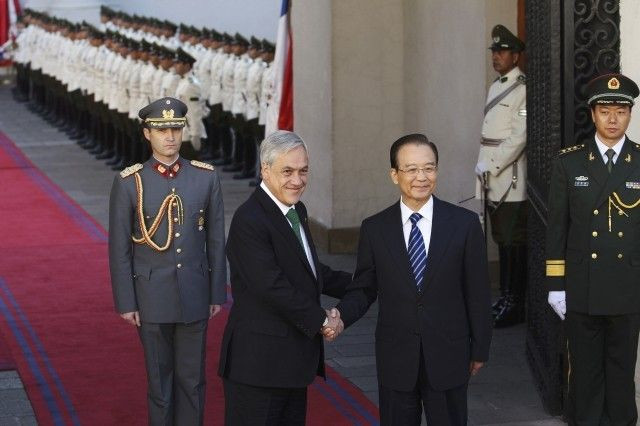China Is Making A Big Splash In America's Backyard

Two months after a sweep through Eastern Europe, and only a week after his government pledged billions in assistance to the European Union, China's Prime Minister Wen Jiabao is throwing his country's economic weight around again, this time in Latin America.
The figures are astonishing. The premier wants to double trade with the region to $400 billion over the next five years (about twice as much as a similar estimate he gave for Eastern Europe). Wen is also offering a free-trade proposal to Mercosur, the South American trade bloc that includes Brazil, Argentina, Paraguay, Uruguay and soon, Venezuela.
The country's growing footprint and influence in the Western hemisphere, an area once thought to be America's backyard, is becoming impossible to ignore.
On Tuesday, China and Chile concluded new agreements to turn their comprehensive cooperative ties into a strategic partnership.
The Chinese side appears to be offering everything it can to its new partner: Everything is on the table -- from polar exploration to space launches, education, mining, technology sharing. The Chilean President, Sebastian Pinera, has asked for more investment from Chinese companies into his country. The Chinese premier is pushing for Chile to conduct a currency swap.
Just last week Brazil and China agreed on a $30 billion currency swap, pushing the yuan further on the track to becoming an international currency.
South America has also become a major commodities provider for China over the past years, as the latter reached out to establish new connections to support its economic expansion. The continent has helped fuel China's demand for raw materials, sending it copper and iron for its booming industries, and agricultural goods for its growing appetites.
According to the U.N. Economic Commission for Latin America and the Caribbean (ECLAC), nearly 9 percent of all exports from Latin America and the Caribbean were headed for China in 2011; almost 14 percent of all imports for the region were from China.
From 2005 to 2011, trade between the entire region and China grew approximately 30 percent.
Just four nations, the ones in Mercosur, account for approximately half of the current trade, about $100 billion.
We share extensive common interests, and we have great potential for further cooperation, which will increase the power of developing countries, Wen told Mercosur heads of state, while hosted by Argentine President Cristina Fernandez in Buenos Aires on Monday.
Qi Fengtian, a Chinese Academy of Social Sciences expert on Latin America, told Chinese state media that considering the rising influence of Mercosur's member nations, I think cooperation with China will contribute more to a fair and rational international trade order.
But there is no doubt that barriers remain to closer relations. As with nearly everywhere else in the world, general disappointment in the global economy, coupled with fears that cheap Chinese products could drive domestic manufacturers out of business, is creating new economic anxieties. But forgoing the benefits of doing business with the world's new economic giant almost always looks to be the worse option.
The two sides should oppose trade protectionism, open markets wider to each other, improve the trade mix, enhance customs and quality inspection cooperation, said Wen to ECLAC on Tuesday.
So, as a means to assuage concerns that Chinese imports will simply steamroll the locals out of business and jobs, Wen is offering a $5 billion cooperative investment fund to incentivize regional manufacturing. Beijing will also give $10 billion in loans to the region through the China Development Bank for infrastructure construction. That means more railways, roads, power plants and telecommunications.
Critics will note that the new infrastructure eventually benefits transporting commodities out of the region (and hence to China) more efficiently. Supporters will note that the money improves domestic conditions and supports local growth.
ECLAC General Secretary Alicia Bárcena said that Latin America and the Caribbean's growing economic and trade ties with China raise [both] opportunities and concerns. But according to Wen, China does not pursue a trade surplus. We not only import raw materials from this region, but want to buy more manufactured goods and high-value-added products so as to achieve balanced and sustainable growth of our trade.
© Copyright IBTimes 2025. All rights reserved.





















